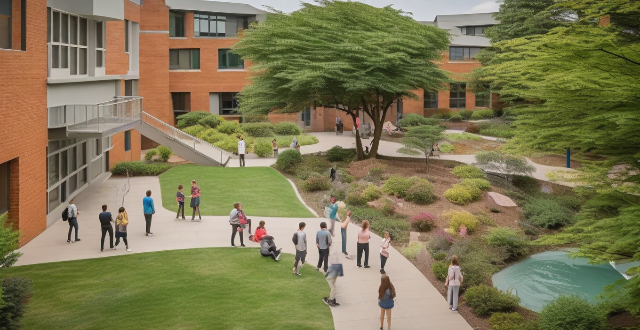Extracurricular Commitment

How do extracurricular activities contribute to the development of student leaders ?
**The Role of Extracurricular Activities in Nurturing Student Leaders** **Skill Development:** Extracurricular activities offer a platform for students to acquire and refine various skills, such as communication, teamwork, time management, and problem-solving. **Confidence Building:** Involvement in extracurricular activities often leads to increased self-assurance through taking initiative and overcoming challenges. **Interpersonal Abilities:** Engaging in extracurricular activities fosters key interpersonal abilities like networking, empathy, emotional intelligence, and influence. **Real-World Experience:** Extracurricular activities simulate real-world experiences where leadership is crucial, teaching organizational skills and adaptability. **Responsibility and Commitment:** Participation teaches responsibility and commitment through accountability and dedication to practice or training. **Conclusion:** Extracurricular activities serve as a laboratory for students to experiment with leadership styles, make mistakes, learn from them, and grow into well-rounded individuals ready to take on future challenges.

How to manage time effectively while participating in multiple extracurricular activities ?
Effective Time Management for Multitasking in Extracurricular Activities is crucial to ensure personal growth and skill development while balancing various commitments. Strategies include prioritizing activities, planning ahead, creating a schedule, minimizing distractions, delegating when possible, reflecting and adjusting, maintaining a healthy lifestyle, and avoiding overcommitment. Following these steps helps manage time effectively and enjoyably in multiple extracurricular activities, with a focus on adaptability and self-care.

Can extracurricular activities help in getting scholarships for college ?
**Extracurricular Activities and College Scholarships** This article explores the role of extracurricular activities in securing scholarships for college. It highlights how these activities help in developing essential life skills, showcasing talents, and building a strong resume, which are highly valued by scholarship committees. The article also discusses specific ways in which extracurricular activities can aid in getting scholarships, such as demonstrating leadership skills and academic achievements, enhancing personal statements, and increasing scholarship opportunities. Overall, it emphasizes the importance of participating in extracurricular activities throughout one's academic journey to improve chances of receiving college scholarships.

How do extracurricular sports activities contribute to overall student development ?
The text discusses the importance of extracurricular sports activities in student development. It highlights that these activities not only promote physical fitness but also contribute to various aspects of personal growth, including social skills, leadership abilities, and time management. The author explains how participating in sports can help students maintain good physical health, develop social skills through teamwork, foster leadership abilities, and learn effective time management skills. The text concludes that extracurricular sports activities are an essential component of overall student development as they offer numerous benefits beyond just physical fitness.

How do extracurricular activities help in developing leadership skills ?
Extracurricular activities are crucial for developing leadership skills in students. They provide opportunities to take on responsibilities, make decisions, work collaboratively, and build confidence. These experiences teach time management, task prioritization, problem-solving, risk assessment, consensus building, effective communication, cooperation, teamwork, overcoming fears, self-efficacy, and feedback for growth. Overall, extracurricular activities help students become effective leaders in their academic lives and future careers.

How to balance academics and extracurricular activities ?
Balancing academics and extracurricular activities is crucial for a well-rounded education. Here are some tips on how to achieve this balance: ## Prioritize Your Time 1. Create a schedule: Make a list of all your academic and extracurricular commitments, including classes, homework, study time, and extracurricular activities. Assign specific times for each task and stick to the schedule. 2. Set priorities: Identify which tasks are most important and prioritize them accordingly. For example, if you have an upcoming exam, you may need to allocate more time to studying than participating in a sports game. 3. Learn to say no: It's okay to decline invitations or opportunities if they conflict with your academic responsibilities. Be honest with yourself about what you can realistically handle. ### Manage Your Time Efficiently 1. Use a planner: Keep track of deadlines, assignments, and extracurricular events in a planner or calendar app. This will help you stay organized and avoid last-minute cramming sessions. 2. Break down tasks: Large projects or assignments can be overwhelming. Break them down into smaller, manageable tasks and tackle them one at a time. 3. Minimize distractions: Turn off your phone, close unnecessary tabs on your computer, and find a quiet place to study. Eliminating distractions will help you focus and complete tasks more efficiently. ### Seek Support When Needed 1. Talk to teachers: If you're struggling to balance academics and extracurriculars, talk to your teachers. They may be able to offer advice or adjust deadlines to accommodate your schedule. 2. Join a study group: Studying with peers can help you stay motivated and accountable. Plus, it's a great way to make new friends who share similar interests. 3. Seek guidance from mentors: Find someone who has successfully balanced academics and extracurriculars before, such as an older sibling or a teacher. They can provide valuable insights and advice based on their experiences.

What are the benefits of participating in extracurricular activities ?
The text discusses the advantages of participating in extracurricular activities. It mentions that such activities promote personal development, socialization and networking, time management, leadership experience, and college and career preparation.

How to choose the right extracurricular activity for your child ?
Choosing the right extracurricular activity for your child is crucial for their development and well-being. Consider your child's interests, skills, and abilities, evaluate the time commitment and logistics, seek recommendations and read reviews, and involve your child in the decision-making process to help them choose an activity they will enjoy and benefit from.

How do athletes balance their commitment to their sport with their religious obligations ?
Athletes can balance their commitment to their sport with their religious obligations by prioritizing, managing time effectively, communicating with others, being flexible, and having a support system.

What are the benefits of joining a sports team as an extracurricular activity ?
Joining a sports team as an extracurricular activity can provide numerous benefits for students, including improved physical fitness and health, socialization and teamwork skills, time management and discipline, leadership and responsibility, mental health and stress relief, and the development of lifelong skills and habits. Overall, participating in sports can have a positive impact on various aspects of student life.

Can extracurricular activities improve academic performance ?
Extracurricular activities can improve academic performance by developing time management skills, increasing motivation and engagement, enhancing social skills and networking, and providing stress relief and mental health benefits.

What are the benefits of extracurricular activities for teenage development ?
This article discusses the benefits of extracurricular activities for teenage development, including improved social skills, personal growth and self-discovery, academic success, physical health and well-being, and lifelong skills and habits.

How do I balance my academic responsibilities with extracurricular activities ?
Balancing academic responsibilities and extracurricular activities requires effective time management, prioritization, setting realistic expectations, seeking support when needed, maintaining a healthy lifestyle, and reflecting on progress to adjust strategies.

What is the impact of school size on the overall learning experience ?
School size affects academic performance, social interactions and extracurricular activities. Small schools offer personalized attention and strong teacher-student relationships but may lack diversity and extracurricular options. Large schools provide diverse course offerings and a wide range of extracurricular activities but may have limited personalized attention and increased competition. Choosing the right school size depends on individual needs and preferences for the best learning experience.

What should I look for in a school's extracurricular activities program ?
When considering a school's extracurricular activities program, look for diversity of options, quality leadership, opportunities for growth and development, and inclusivity and accessibility. A well-rounded program will foster personal growth, leadership skills, and community among participants.

What are the most popular extracurricular activities in high school ?
The text discusses the various extracurricular activities available in high school. These activities provide opportunities for students to pursue their interests, develop new skills, and build relationships outside of the classroom. The most popular activities include sports, music and theatre, academic clubs, community service and volunteering, hobby and special interest clubs, and athletic support groups. Participating in these activities can help students discover their interests, build character, and create lasting memories.

How to start a new extracurricular club at school ?
Starting a new extracurricular club at school can be an exciting and rewarding experience. It allows you to pursue your interests, meet new people, and develop leadership skills. Here are the steps to follow: 1. Identify your interests and goals for starting the club. What do you want to achieve? Is it to learn a new skill, share your passion with others, or make a difference in your community? Having a clear vision will help you stay motivated and focused throughout the process. 2. Research existing clubs at your school to see if there are any similar groups already in place. This will help you determine if there is a demand for your proposed club and what unique aspects you can bring to it. 3. Gather support from other students who share your interests and goals. Talk to them about your idea and ask if they would be interested in joining. You can also seek advice from teachers or staff members who may have experience starting clubs. 4. Create a proposal that outlines the purpose, goals, and structure of your club. Include details such as meeting times, membership requirements, and potential activities. Make sure your proposal is well-organized and clearly communicates your vision. 5. Submit your proposal to the appropriate person or committee at your school. This may vary depending on your school's policies and procedures. Be prepared to answer questions and provide additional information if needed. 6. Once your proposal is approved, start recruiting members by spreading the word through posters, social media, and word of mouth. Host an interest meeting or event to introduce potential members to your club and its activities. 7. Plan activities and events that align with your club's goals and interests. This could include workshops, guest speakers, service projects, or competitions. Make sure to involve your members in planning and decision-making processes. 8. Promote your club through various channels such as school announcements, newsletters, and social media platforms. Attend school events and showcase what your club does to attract more members and raise awareness. 9. Regularly evaluate your club's progress and adjust accordingly. Solicit feedback from members and stakeholders to improve and ensure that your club continues to meet its goals and objectives.

How do I choose an executor for my will ?
Choosing an executor for your will is a crucial decision that requires careful consideration. An executor is responsible for carrying out the instructions in your will and managing your estate after you pass away. Here are some factors to consider when selecting an executor: 1. Trustworthiness and Integrity: Choose someone who is reliable, trustworthy, and has strong moral values. 2. Ability to Manage Finances: Consider someone with financial expertise and organizational skills. 3. Availability and Commitment: Make sure the person has enough time and willingness to make a long-term commitment. 4. Family Dynamics and Relationships: Consider choosing a family member with good relationships or a neutral third party to avoid conflicts. 5. Legal Requirements and Restrictions: Check age requirements and ensure the person has the capacity to act as an executor.

How do I write a successful scholarship application letter ?
This guide provides tips on how to write a successful scholarship application letter, including an introduction that grabs the reader's attention and highlights academic achievements, extracurricular activities, and community involvement. The body of the letter should focus on these areas, highlighting strengths and accomplishments, while the conclusion summarizes main points and reiterates why the candidate is a strong choice for the scholarship. The closing should be polite and include contact information.

How does a company's commitment to climate-related CSR influence its ability to attract and retain top talent ?
The influence of climate-related CSR on talent attraction and retention is significant. Companies committed to environmental sustainability can attract environmentally conscious candidates, enhance their brand image, create an innovative work environment, provide fulfilling career opportunities, foster a positive work culture, and offer competitive compensation and benefits. This commitment helps retain high-performing employees who feel fulfilled by their work and share the company's vision for a better future.

How do I compare different schools based on their academic performance ?
When comparing different schools based on their academic performance, consider factors such as school rankings, standardized test scores, graduation rates and college acceptance rates, availability of advanced placement (AP) courses and dual enrollment options, extracurricular activities and clubs, student-teacher ratio and class size, and reviews from current and former students, parents, and educators.

How can education institutions foster climate leadership among students ?
Education institutions can foster climate leadership among students through curriculum integration, extracurricular activities, infrastructure improvements, collaboration and partnerships, and policy and leadership support. By adopting these strategies, they can contribute to global efforts in mitigating climate change.

What role do schools play in promoting climate awareness ?
Schools are vital for promoting climate awareness by integrating climate change into their curricula, offering extracurricular activities, collaborating with the community, implementing sustainable practices, and supporting teacher professional development to inspire students towards environmental responsibility.

How effective are international climate commitments in reducing carbon emissions ?
International climate commitments, such as those made under the Paris Agreement, aim to reduce carbon emissions and limit global temperature rise. These commitments vary in ambition and implementation can be challenging due to political, economic, and technological factors. Monitoring and verification mechanisms exist but have flaws. Many commitments focus on long-term goals, making immediate impact assessment difficult. However, they can inspire policy changes, technological innovation, and raise public awareness, leading to indirect emissions reductions. The effectiveness of these commitments depends on a range of factors including political will, economic conditions, technological advancement, and societal engagement.

How can I increase my chances of getting a scholarship ?
To increase your chances of getting a scholarship, researchTo increase your chances of getting a scholarship, research strong academic record, engage in engage in extracurricular activities and community service, prepare compelling application materials including personal statements and recommendations, and stay organized throughout the application process.

What are the key factors to consider when choosing an international school or program ?
When selecting an international school or program, consider factorsWhen selecting an international school or program, consider factorsation and reputation, curriculum and extracurricular activities and opportunities for internships or study abroad, cultural diversity and inclusivity, location and facilities, and cost and financial aid options. These considerations can help ensure that the chosen institution aligns with your academic goals and personal preferences, fostering both academic success and personal growth.

What role do schools play in fostering environmental consciousness among students ?
Schools play a pivotal role in nurturing environmental awareness in students by integrating eco-themes into curriculum, organizing extracurricular activities, maintaining green infrastructure, engaging with the community, modeling sustainable behaviors, setting eco-friendly policies, running awareness campaigns, offering service learning opportunities, and implementing assessment and recognition programs. These efforts not only educate students about environmental issues but also empower them to take actionable steps toward preserving the planet.

What role do education systems play in promoting scientific literacy among women ?
Education systems play a crucial role in promoting scientific literacy among women by providing equal access to education, encouraging female teachers, offering extracurricular activities, addressing gender bias, and providing mentorship programs.
![What subjects did [insert celebrity name] study in college ?](/images/3nde/d0c5972b-3f94-4446-a867-a064f066a8ad.png)
What subjects did [insert celebrity name] study in college ?
The academic pursuits of [insert celebrity name] during their college years are explored in this article. The primary field of study for the celebrity is discussed, along with any minor fields of interest and elective courses taken. Notable projects and theses completed by the celebrity are highlighted, as well as their involvement in extracurricular activities. The article also discusses the celebrity's post-college pursuits and how their education played a role in shaping their career.